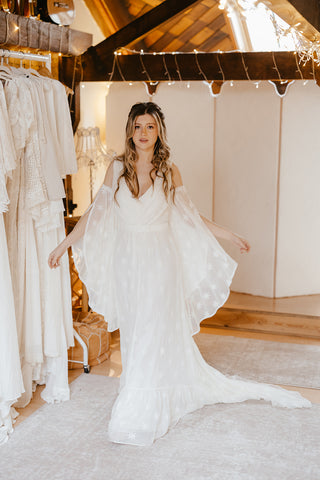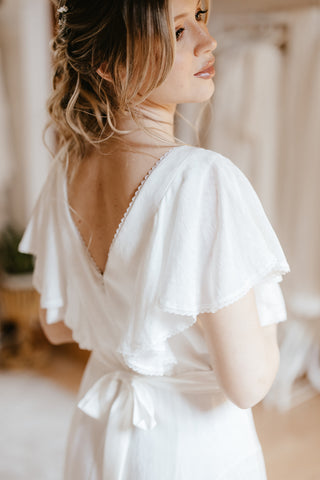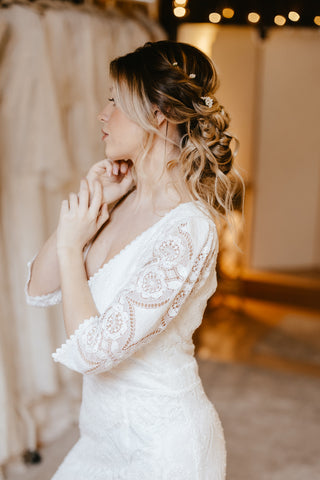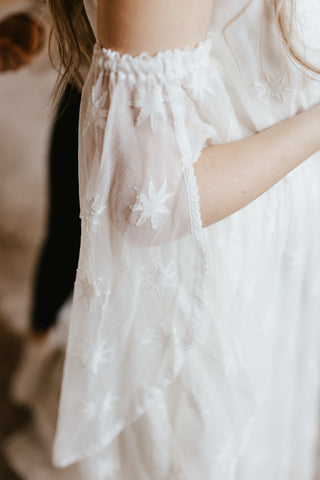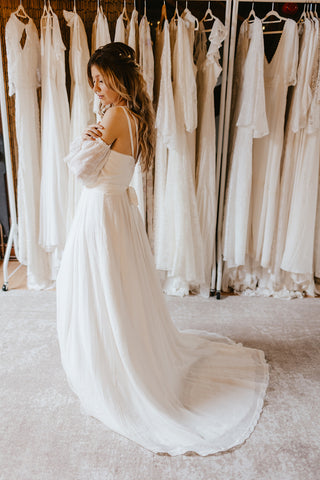Practised by many modern brands and shops to attract the ever-growing conscious consumer base, greenwashing is the intentional act of misleading consumers by trying to falsely appear sustainable or more sustainable than the brand in reality is. Massive fashion brands like Asos, H&M and Zara have been called out for greenwashing in the past. Claims like “eco” and “sustainable” are vague and not regulated in any way globally or even locally, and this makes the whole sustainable fashion industry a bit of a wild west, free of global standards for these words, leaving the responsibility to the consumer.
Greenwashing is unethical and a clear sign that the company is trying to ride the wave of the growing customer base of environmentally conscious consumers and cash in. As the director of a bridal wear brand with a sustainable heart, I am passionate about spreading awareness about slow and sustainable bridal fashion, and I hope this blog post will shine a little light on this complicated issue. In order to look into greenwashing in bridal fashion more closely, we need to first define sustainability.
What is sustainability in the context of fashion?
Sustainability in general is a very complicated matter, but to be better understood, it can be divided into two distinct but interconnected categories of problems; 1) environmental issues that affect the environment and climate, and 2) societal, or, in other words, ethical, issues that affect people and animals. Read a more precise explanation of sustainability in fashion in our blog post, “What can be considered a sustainable wedding dress?”.
Examples of environmentally sustainable choices that bridal brands can make include:
- Choose sustainable materials (locally manufactured fabrics, fabrics that are composed of natural, organic or recycled fibres, fabrics that are manufactured in a closed loop like Tencel)
- Choose recycled or biodegradable packaging
- Not mass produce their wedding dresses, but practise made-to-order production system
- Choose to manufacture locally to cut down the environmental impacts of shipping
Examples of ethical choices that bridal brands can make include:
- Use local (EU or UK based for example) fabric manufacturers to ensure that the manufacturing process of the fabric doesn’t affect local people in a negative way, for example, during the dyeing process.
- Donate to charity
- Choose to manufacture their wedding dresses locally to ensure the workers are paid and treated fairly and to make sure no child labour has been used
How can I recognise greenwashing when shopping for my wedding dress?
3 claims to be aware of:
- Announcing vaguely that the fabrics the brand uses come from the UK, or that they use UK based suppliers. While supporting the domestic economy is always good, this doesn’t necessarily mean that the fabrics are manufactured in the UK. Usually, this means that the fabrics are only supplied by a UK based company that might have bought the fabrics from Bangladesh, for example. In saying this, the brand tries to make it seem like they use locally manufactured fabrics, which is not true. To avoid making a decision based on misinformation, ask specifically where the actual material the dress is made from is manufactured. A sustainable and ethical brand should be able to tell you this and, in some cases, even trace the origin of the fibres.
- Advertising vegan fabrics as automatically sustainable and ethical. Vegan fabric can mean a polyester fabric made in Bangladesh using child labour. Always ask what the fabric is made of and where the fabric is made.
- Advertising the use of “eco fabrics”. These can be fabrics that are composed of, for example, 5% recycled polyester and 95% virgin polyester. Needless to say, even though recycled polyester is used, the fabric in this example cannot be considered ecological. The only way to make sure that the fabric really is ecological is for it to be manufactured in a country that has standards for employee rights or for the fabric to have a certification like Ecocert, GOTS or OEKO-TEX.
While greenwashing is unfortunately widespread in the fashion industry, we need to keep in mind that greenwashing is one thing and not knowing is another. Sometimes bridal brands and boutiques just can’t keep up with the latest information about what’s sustainable and what's not. Sustainable fashion is an ever evolving and complicated area, and with the wedding industry being largely made up of small businesses and one woman bands (like Indie Bride London), it’s very hard to have all the most up-to-date information at hand. It’s impossible to be a 100% sustainable business and make 100% sustainable wedding dresses, but offering the boutique or brand the opportunity to be transparent by asking questions is the best way to make sure you’ll find a dress that matches your values.
Here is some further reading. Good On You lists 8 fashion brands and how they have been guilty of greenwashing, and Conscious Life and Style and Ecolove both give brilliant examples of how to spot greenwashing in the fashion industry.
- Miina -
Image credits:
Photographer: @bethanysmith_photo
Model: @_kayleemariex
Makeup: @makeupbycarliex
Hair: @staciegoodwinbridalhair


